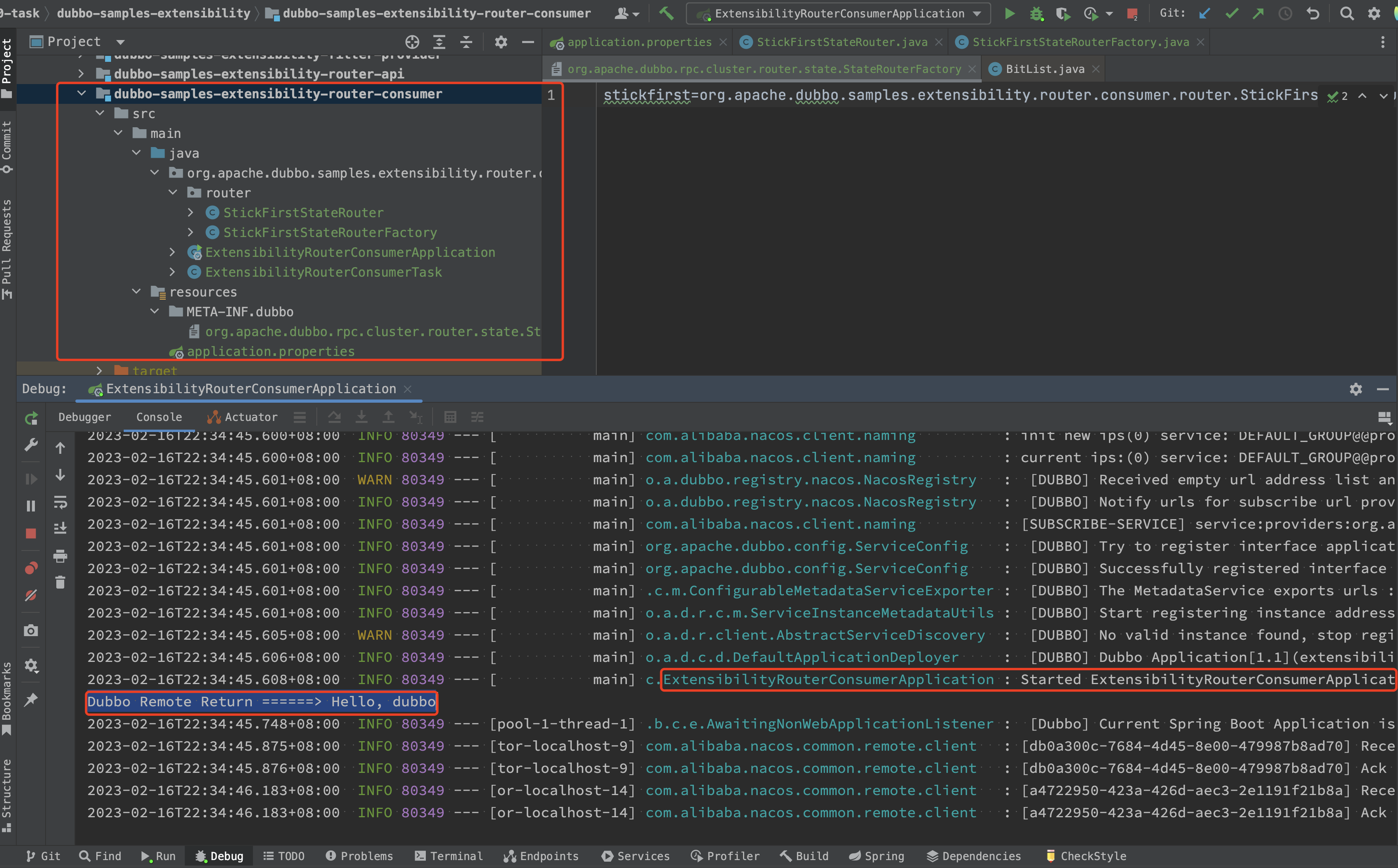路由器
自定义路由策略
通过创建自定义路由器,您可以根据业务场景的特点实现特定的路由方法。
先决条件
选择两种部署和运行方法之一
基于 Kubernetes
- 安装 Kubernetes 环境
- 修改 Provider 中的配置文件以启用部署在 Kubernetes 中的 nacos 的地址
# (The configuration remains the same as in the original documentation) - 修改 Consumer 中的配置文件以启用部署在 Kubernetes 中的 nacos 的地址
# (The configuration remains the same as in the original documentation) - 部署 可扩展性路由器任务
使用本地 IDE
- 部署 Nacos 版本 2.2.0
- 修改 Provider 中的配置文件以启用本地 nacos 地址
# (The configuration remains the same as in the original documentation) - 修改 Consumer 中的配置文件以启用本地 nacos 地址
# (The configuration remains the same as in the original documentation)
任务详情
任务是坚持使用第一个开始提供服务的 Provider。如果该 Provider 离线,则选择一个新的 Provider。
实现方法
在 Consumer 中创建一个自定义路由器。在这个路由器中,保存第一次调用时使用的 Provider。对于后续调用,如果 Provider 列表包含第一次调用时使用的 Provider,则继续使用它;否则,选择一个新的 Provider。
代码结构
src
|-main
|-java
|-org
|-apache
|-dubbo
|-samples
|-extensibility
|-router
|-consumer
|-router
|-StickFirstStateRouter.java (Implement StateRouter interface)
|-StickFirstStateRouterFactory.java (Implement StateRouterFactory interface)
|-resources
|-META-INF
|-application.properties (Dubbo Consumer configuration file)
|-dubbo
|-org.apache.dubbo.rpc.cluster.router.state.StateRouterFactory (Plain text file)
代码详情
- StickFirstStateRouter
package org.apache.dubbo.samples.extensibility.router.consumer.router;
import org.apache.dubbo.common.URL;
import org.apache.dubbo.common.config.configcenter.ConfigChangeType;
import org.apache.dubbo.common.config.configcenter.ConfigChangedEvent;
import org.apache.dubbo.common.config.configcenter.ConfigurationListener;
import org.apache.dubbo.common.logger.ErrorTypeAwareLogger;
import org.apache.dubbo.common.logger.LoggerFactory;
import org.apache.dubbo.common.utils.CollectionUtils;
import org.apache.dubbo.common.utils.Holder;
import org.apache.dubbo.rpc.Invocation;
import org.apache.dubbo.rpc.Invoker;
import org.apache.dubbo.rpc.RpcException;
import org.apache.dubbo.rpc.cluster.router.RouterSnapshotNode;
import org.apache.dubbo.rpc.cluster.router.state.AbstractStateRouter;
import org.apache.dubbo.rpc.cluster.router.state.BitList;
public class StickFirstStateRouter<T> extends AbstractStateRouter<T> implements ConfigurationListener {
public StickFirstStateRouter(URL url) {
super(url);
}
public static final String NAME = "STICK_FIRST_ROUTER";
private static final ErrorTypeAwareLogger logger = LoggerFactory.getErrorTypeAwareLogger(StickFirstStateRouter.class);
private volatile BitList<Invoker<T>> firstInvokers;
@Override
protected BitList<Invoker<T>> doRoute(BitList<Invoker<T>> invokers, URL url, Invocation invocation, boolean needToPrintMessage, Holder<RouterSnapshotNode<T>> routerSnapshotNodeHolder, Holder<String> messageHolder) throws RpcException {
if (CollectionUtils.isEmpty(invokers)) {
if (needToPrintMessage) {
messageHolder.set("Directly Return. Reason: Invokers from previous router is empty.");
}
return invokers;
}
BitList<Invoker<T>> copy = invokers.clone();
if (CollectionUtils.isEmpty(copy)) {
this.firstInvokers = new BitList<>(BitList.emptyList());
this.firstInvokers.add(copy.get(0));
} else {
this.firstInvokers = copy.and(invokers);
if(CollectionUtils.isEmpty(this.firstInvokers)){
this.firstInvokers.add(copy.get(0));
}
}
return this.firstInvokers;
}
@Override
public void process(ConfigChangedEvent event) {
if (logger.isDebugEnabled()) {
logger.debug("Notification of tag rule, change type is: " + event.getChangeType() + ", raw rule is:\n " +
event.getContent());
}
// Reset
if (event.getChangeType().equals(ConfigChangeType.DELETED)) {
this.firstInvokers = null;
}
}
@Override
public void stop() {
super.stop();
this.firstInvokers = null;
}
}
- StickFirstStateRouterFactory
package org.apache.dubbo.samples.extensibility.router.consumer.router;
import org.apache.dubbo.common.URL;
import org.apache.dubbo.rpc.cluster.router.state.StateRouter;
import org.apache.dubbo.rpc.cluster.router.state.StateRouterFactory;
public class StickFirstStateRouterFactory implements StateRouterFactory {
@Override
public <T> StateRouter<T> getRouter(Class<T> interfaceClass, URL url) {
return new StickFirstStateRouter<>(url);
}
}
SPI 配置
在 resources/META-INF/dubbo/org.apache.dubbo.rpc.cluster.router.state.StateRouterFactory 文件中添加以下配置
stickfirst=org.apache.dubbo.samples.extensibility.router.consumer.router.StickFirstStateRouterFactory
配置文件
在 resources/application.properties 文件中添加以下配置
# Configure custom router
dubbo.consumer.router=stickfirst
执行结果
使用 使用本地 IDE 方法运行任务,结果如下

总而言之,Dubbo 的可扩展性允许您创建自定义路由器,提供了一种根据您的业务需求自定义路由逻辑的方法。本教程演示了如何创建“坚持使用第一个 Provider”的路由策略,这对于优化网络流量和减少延迟很有用。
上次修改时间:2023 年 11 月 1 日:Translate extension related docs (#2844) (e603103c03a)
